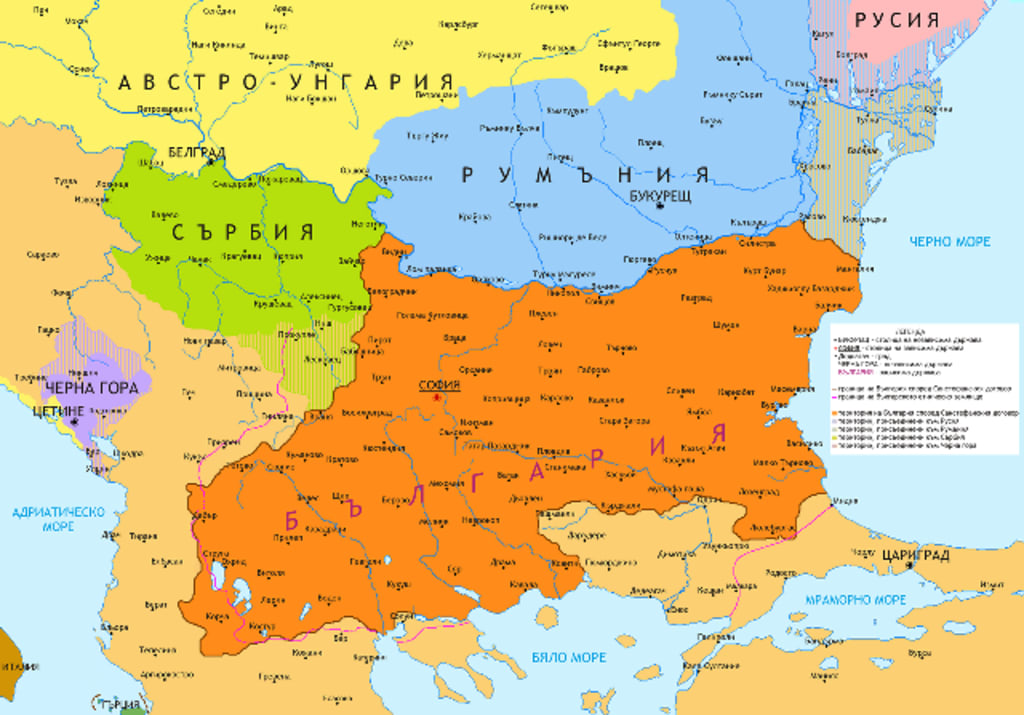Treaty of San Stefano
Treaty of San Stefano

The Ottomans settled at San Stefano (now Asilcoy) on the western edge of the city, and, as the name implies, he and the Ottomans entered into a treaty, which they signed on March 3. On March 3, 1878, Russia and Turkey signed a "preliminary peace treaty" in Santo Stefano, which established, with attached maps, new borders for Montenegro and Serbia. Unsurprisingly, the treaty also made provision for the creation of Great Bulgaria. The treaty provided for the creation of an autonomous principality of Bulgaria after nearly 500 years of Ottoman rule.
However, Bulgaria's expansion under the treaty worried neighboring states as well as France and the UK. The Great Powers did not approve of the expansion of Russian power, and Serbia and Greece feared that the creation of Bulgaria would jeopardize their independence, so the Great Powers achieved a revision of the 1878 Treaty of Berlin. But Great Britain and Austria-Hungary, believing that the new state would extend Russia's influence too far in the Balkans, exerted strong diplomatic pressure, which resulted in the Treaty of St. Stephen turning into the Treaty of Berlin four months later. Ottoman troops would be withdrawn from Bulgaria, and Russian military occupation would continue for the next two years (Article 8).
According to the treaty, Montenegro more than doubled its territory at the expense of former Ottoman territories such as Nikic, Podgorica, and Bar (Article 1), and the Ottoman Empire recognized its independence (Article 2). Serbia annexed the Moravian cities of Ni and Leskovac and became independent (Article 3). According to the treaty, the territory of Montenegro was more than doubled and the territories previously controlled by the Ottoman Empire, including the cities of Nikic, Podgorica, and Bar (Article 1). The Ottoman Empire recognized its independence (second). Romania also achieved independence, ceding southern Bessarabia to Russia, but this was offset by the acquisition of Dobrugia in the Black Sea.
Bulgaria became an autonomous principality and greatly expanded, and the Ottoman Empire promised reforms in Bosnia and Herzegovina. The treaty legally established an autonomous and autonomous taxing principality of Bulgaria with the right to maintain a Christian government and an army, although the de facto state functioned as an independent state. The treaty provided for the creation of an autonomous Bulgarian state (protected by Russia), roughly the same size as the First Bulgarian Empire, bordering the Black and Aegean Seas.
However, according to Russia's official position, since the signing of the treaty, Russia has planned nothing but a preliminary draft to allow for a final agreement with the other great powers [3], this initial treaty almost immediately. became central. Point of Bulgarian foreign policy, which lasted until 1944 and led to Bulgaria's involvement in the Second Balkan War and World War I. The treaty, signed on March 3, 1878, ended one of the largest wars between Russia and the Ottoman Empire (1877–1878). On February 19 (March 3), 1878 in the city of Santo Stefano (western suburb of Constantinople, since 1926 - Istanbul), a preliminary peace agreement was signed between the Russian and Ottoman Empires, which ended the Russian-Turkish war. War of 1877-1878.
As a result of the Russo-Turkish War of 1877–1878, Russia conquered most of the European part of the Ottoman Empire. The war also highlighted the weakness of the Ottoman Empires and the length of time some European powers (Britain and France) were prevented from intervening and harassing other European powers (Russia and, to a lesser extent, Austria-Hungary). World. 'balance of power. Britain has long opposed the rise of Russia at the expense of the Ottoman Empire, and in particular against Russia's invasion of the Turkish Straits.
Romania, which contributed significantly to Russia's victory in the war, was deeply disappointed by the treaty, and the Romanian public regarded some of its provisions as a violation by Russia of the pre-war Russo-Romanian treaties, which guaranteed the integrity of Romanian territory. . These reasons prompted the Great Powers to amend the treaty at the Berlin Congress and replace the Berlin Treaty. The results of the treaty led to the formation of the Prizren League.
In the Salisbury Circular of 1 April 1878, the British Foreign Secretary Salisbury clearly expressed his government and his government's objections to the Treaty of St. Stephens and the favorable conditions in which he leaves Russia. On April 1, 1878, Lord Salisbury issued a circular note amending the Treaty of St. Stephen to end the exclusive benefits of Russia, to protect British interests, and to ensure reform, without prejudice to Turkish sovereignty. proposed. subject status. Turkish people. The Ottoman Empire's main expectation from the conference was that Britain would make significant changes to the Treaty of Cyprus to soften the terms of the Treaty of St. On February 5, 1878, the Austrian government proposed to convene a conference of powers in Vienna that signed the treaties of 1856 and 1871.
The result of general discontent with St. Stephen was the Berlin Conference, also organized by Bismarck. The conference was held from mid-June to mid-July 1878 and involved the six recognized European powers (Austro-Hungary, Britain, France, Germany, and Italy). and Russia), the Ottoman Empire, and four smaller countries (Greece, Montenegro, Romania, and Serbia) were all affected by these events. While these developments continue, negotiations between the committees began within the infrastructure established by the ceasefire talks in Edirne, which took place in the last week of February at the Russian Army Commander-in-Chief Grande Nicolas in Santo Stéphane. Held at the Headquarters of Connaught. 1878. After a complete defeat in the war, the Turkish government requested an armistice from Russia.
On February 19 (March 3), 1878, Russia and the port signed a peace treaty in San Stefano, taking into account the preliminary agreement concluded in Adrianople on January 19 (31). It was founded on March 3, 1878, on behalf of the Russian Empire by Counts Nikolai Pavlovich Ignatiev and Alexander Nelidov and ministers in Saint Stephen (Greek: Agios), a village west of Istanbul. Stefanos, "Agios Stefanos", now Essirkoy). On behalf of the Ottoman Empire, foreign Safavit Pasha, and the German ambassador Saduraibe. Stephen's Treaty of 1878 was a treaty signed between Russia and the Ottoman Empire after the end of the Russo-Turkish War in 1877–1878. The Treaty of Santo Stefano (March 3, 1878 [old February 19]) was a peace agreement that Russia imposed on the Ottoman government at the end of the Russo-Turkish War of 1877–78.
He also ceded northern Dobruja, which Russia ceded to Romania in exchange for southern Bessarabia (Article 19). Russia gained southern Bessarabia, which was separated by the Treaty of Paris of 1856, as well as territories up to Ardahan, Kars, Batumi, Bayazet, Asia, and Sognalug.
In modern history, Armenians first mentioned the name Armenia in an international treaty. When the Ottoman congressmen began negotiations with Russia in Edirne (January 1878), the Armenians took diplomatic action, including the signing of a peace treaty about them and an article in Edirne. Inside visited Grand Duke Nicholas and Count Ignatieff. Albanians living in provinces controlled by the Ottoman Empire protested their belief that their territories were severely lost to Serbia, Bulgaria, and Montenegro, and realized that they should be organized at the national level so that they sought neutrality. to get the aid of Russian influence from foreign powers. In area.





Comments
There are no comments for this story
Be the first to respond and start the conversation.